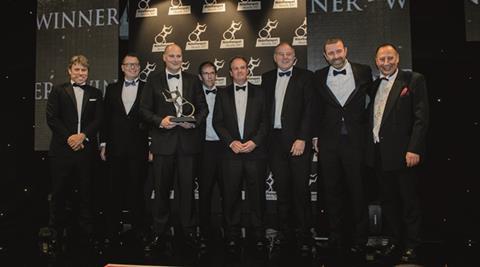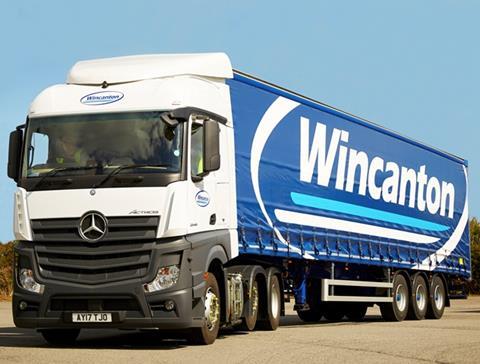
This year’s winner of the Haulier of the Year award was Wincanton, the UK’s largest logistics
operator, which has seen a remarkable turnaround in performance after a difficult few years.
Wincanton, the largest British logistics operator with more than 200 locations, 3,500 vehicles and 5,000 drivers, has seen a remarkable turnaround in its performance in recent years.
After some badly timed overseas and UK investments ahead of the 2008 credit crunch, Wincanton struggled, with debts reaching £152m in 2011. Eric Born came in as CEO and restructured
the business, pulling it out of Europe, and his successor Adrian Colman has continued the turnaround since stepping up from CFO in 2015.
The company has cut net debt from £65m to £40m in the past two years and reduced the pension deficit. It made pre-tax profits of £65m on turnover of £1.1bn last year and the share price rose from 148p in
March 2016 to 282p in February 2017.
“Wincanton is a fantastic business that has come through some difficult times,” said one judge. “This is a remarkable success story,” added another.
Operating in the general haulage, container haulage, construction, grocery and retail, home and DIY and general merchandise sectors, Wincanton also owns the R&M network Pullman Fleet Services. Business
highlights of 2016 were securing the national transport contract with discount retailer Wilko
and entering the ready-mixed concrete market with an eight-year contract with Hanson.
A team effort
Chris Fenton, MD, Industrial and Transport, collected the trophy on behalf of the company and told MT Wincanton was “immensely pleased” to be awarded the Haulier of the Year title. “We are a British business with more than 90 years of history, and it is really good recognition for all the 18,000 people
who work at Wincanton,” he said. “I was simply the person collecting the award, as it really was a team effort to win something of this scale.”
Fenton was appointed MD in April 2016 after joining Wincanton in 1996 straight from Cardiff University, where he studied international transport. He has also completed an MBA at Warwick University and worked in a variety of operational and change management roles across the business in his 20 years with the company.
“My career has been in Wincanton,” Fenton said. “It has been very diverse in terms of the number of contracts I’ve worked across and it’s presented me with fantastic opportunities. It’s been a business where I’ve never stood still; and then to get the opportunity to do one of the top jobs was what I set out to do.”
Industrial and Transport brings in 42% of group revenue and includes transport services (container and general haulage), construction, food and fuel tanker operations, defence and the Pullman R&M business. Alongside Liam McElroy, MD, Retail and Consumer Goods, Fenton reports into CEO Adrian
Colman.
“Although we organise the business into the two operating segments, there are a number of services that I provide to Retail and Consumer,” said Fenton. “For example, I provide all the repairs and maintenance,
both to the external market and across Wincanton.
“Part of creating Industrial and Transport was to get the transport-related activity into the same place under a single point of leadership but also there are services that I provide to Retail and Consumer and, where required, vice versa.
“I look after group fleet so I am responsible for the operating licence and fleet engineering for the business.”
Despite its size, Fenton said Wincanton keeps its management structure flat to ensure decisions can be made quickly.
“I sit on the operating board and report to Adrian,” he said. “I’ve got a number of directors who run the business units, each with their own general management teams, so there are not lots of layers. That’s important for quick decision-making and effective communication across the organisation. If
we had too many, you’d just be pushed further and further away.”
Changing habits
Wincanton is looking to expand both sides of the business, and Fenton said there were “a lot of opportunities” in online retail.
“We’re seeing changes in buying habits and changes in the channels to serve the digital marketplace and that’s obviously a big growth area for us,” he said. “We’ve got to be agile enough to provide different solutions.”
Wincanton is, however, not turning its back on more traditional haulage businesses such as construction. “We know there’s going to be investment around infrastructure and we see construction as a key market for us to invest in,” said Fenton. “So we’ve recently gone into the ready-mix business. A year ago, we didn’t have anything within ready-mix, and a year later we’re a big player with more than 100 vehicles in that market.”
Although Wincanton has extricated itself from mainland Europe, it is still involved in international transport.
“We do work with customers in international markets so we will get customers saying they want to expand and asking if we can help them,” said Fenton. “Sometimes we will put resources into the market, and we’re doing that at the moment to help them develop that capability.
“We do quite a bit of international freight and buy transport both in and out of the UK to support our customers. It’s not on a massive scale and there’s no intention to start buying and acquiring across Europe, but we work with some really big brands and a requirement of those brands is having an
international capability.”
Fleet make-up
The 3,500 vehicles Wincanton runs are a mix of owned and leased. “The lease agreement works for us in terms of getting the right cost to serve, but there are other times where it makes sense to own equipment because it gives us more flexibility,” said Fenton. “There are a number of assets more recently that we’ve chosen to own, but the reality is we’ll look at the returns and the best solution for it depending on the business case.

"There are still customers who want to buy their own equipment and have us operate it for them. That’s always been the case in our markets. We may see some change in that as customers are taking the view that they’re just going to buy haulage capacity from us.”
Collaboration has been talked about for many years by retailers looking to cut their transport costs, and Fenton said the talk is now translating into action.
“We work more collaboratively every day, particularly with retailers, utilising our fleet capacity as well as theirs, rather than just adding more capacity,” he said. “Getting better utilisation out of the fleet is important and there are still lots of opportunities for our industry to be even more collaborative.”
Standard bearer
As a Carbon Trust standard bearer, Wincanton is committed to reducing its carbon emissions, achieving an 11% reduction in the past two years. A large part of that has been done by reducing empty running, as well as choosing the right equipment for the job.
“We’ve invested a lot of money in the past 18 months, buying the latest equipment,” said Fenton. “That includes some of the technology that is going to be deployed in vehicles of the future – perhaps in the long run including some level of autonomous capability.
“Our drivers are obviously a core element of our business, both now and in the future, and right now some of that equipment is intended to guide them in terms of gear selection and using the GPS more intelligently.”
Wincanton was a pioneer of longer semitrailers and has just signed up to provide data for a project to develop more aerodynamic vehicles backed by Office for Low Emission Vehicles’ Innovate UK fund.
Safety is also a key focus for Wincanton, which is on track to hit its target of reducing lost-time accident rates by 70% over the past five years. Key elements in this achievement are its STAR – stop, think, assess, react – and GOAL – get out and look – campaigns to persuade staff to take responsibility for their own safety.
“We’re trying to create something that’s memorable and that our management teams can use,” said Fenton. “Everything we deliver has to be really simple to brief to large teams, easy to remember but also relevant.
“Part of the general managers’ focus is to work directly with the health and safety director to bring that operational site to the high standards we aim for. So some auditing, a lot of behavioural training, and then, ultimately, it comes down to the quality of the management.
“The results show that we have made a significant improvement in terms of our
safety performance. From a health and safety perspective, Wincanton is a market leader.”
Fenton argues that looking after the health as well as the safety of its 5,000 drivers makes financial as well as moral sense. “What we plan to do with wellness is to provide access to healthy food on our sites
and to incorporate some preventative measures. For example, we have developed a kiosk where a driver can get a self-service health check. As a result we have been able to provide opportunities for intervention which has seen some drivers contact their GPs.
"This intervention has had a positive impact on the drivers’ health and ensures we continue
to operate in the safest manner.”
Wincanton also takes the safety of vulnerable road users extremely seriously and has been a big supporter of the Fleet Operator Recognition Scheme (FORS).
“We have a number of sites that are FORS silver,” said Fenton. “The important thing for the industry is that we agree on a standard, which doesn’t become different if it’s in Manchester or Birmingham. We need consistency.”
Ahead of the curve
To make sure it keeps ahead of the innovation curve Wincanton has joined with specialist start-up investor L Marks to launch W2 Labs, an incubator programme to exploit disruptive technologies developed by small companies.
“It has two elements but the most important is that we’ve gone out to a number of start-up businesses around the world and invited them to pitch their services against six corporate goals.
“One of them includes load exchange and using big data to improve vehicle utilisation, and we’ve asked those businesses to come back with their ideas of what the solution could be. We’ve selected a group of about seven companies that we’re working with now and we are excited to continue this journey with them.”











